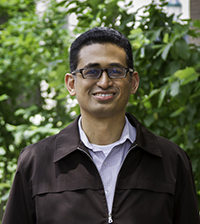Rand Quinn and Students to Explore Impact of Philadelphia Education Crisis on Local Neighborhoods
June 25, 2013 - There’s no question that the School District of Philadelphia is in crisis, with severe budget shortfalls and hemorrhaging of students to area charter schools forcing the district to shutter schools and layoff employees. Less certain is the impact these challenges—and measures taken to address them—are having on area neighborhoods. Assistant Professor Rand Quinn and students in Penn GSE’s Teaching, Learning, and Leadership (TLL) division are planning to tackle this question in an upcoming research seminar. Working in small groups, students will develop and answer policy-relevant questions related to the impact of school reform on local neighborhoods and their schools.
 Quinn joined Penn GSE in the fall of 2012, and he quickly earned a reputation for embodying the division's commitment to excellence and equity in education. “Quinn's research interests are particularly salient in Philadelphia,” says TLL Chair Torch Lytle. “He has found ready opportunity to study private sector engagement in public education, the politics of race and ethnicity in urban school reform, entrepreneurialism in the charter school movement, and the political impact of youth organizing for school reform.”
Quinn joined Penn GSE in the fall of 2012, and he quickly earned a reputation for embodying the division's commitment to excellence and equity in education. “Quinn's research interests are particularly salient in Philadelphia,” says TLL Chair Torch Lytle. “He has found ready opportunity to study private sector engagement in public education, the politics of race and ethnicity in urban school reform, entrepreneurialism in the charter school movement, and the political impact of youth organizing for school reform.”
A former community organizer, Quinn worked on behalf of underserved students, homeless families, and immigrants at nonprofits like Building Opportunities for Self-Sufficiency and the Services, Immigrant Rights, and Education Network. Experiencing firsthand the impact of the inequality facing these groups, he was spurred to pursue a career in education.
Quinn earned a Ph.D. in Education (Policy Analysis) at Stanford University, focusing on understanding the impact of private sector initiatives and community-based institutions on public education. Since arriving at Penn GSE, he's had the opportunity to combine these research interests with practice.
The TLL division - known for its interdisciplinary approach to school- and community-based education - offers five degree programs, united by an ambitious focus on teaching and learning in a range of formal and informal educational settings. The Teaching, Learning, and Leadership (M.S.Ed.) program prepares students to work in educational and leadership capacities, both in and outside of formal classroom settings. In the Educational Leadership (Ed.D.) program, a select group of doctoral students become instructional leaders in public and non-public schools, state agencies, and new entrepreneurial ventures.
For information on additional TLL programs, click here.
Photograph by Allison Dougherty
